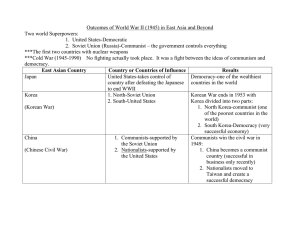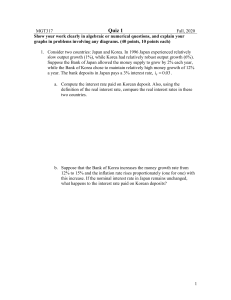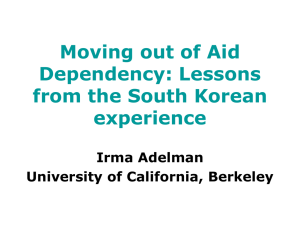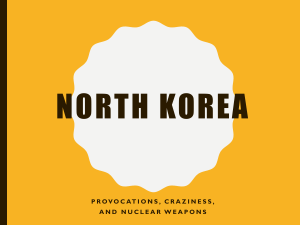North Korea Overview: Politics, Economy, and International Relations
advertisement
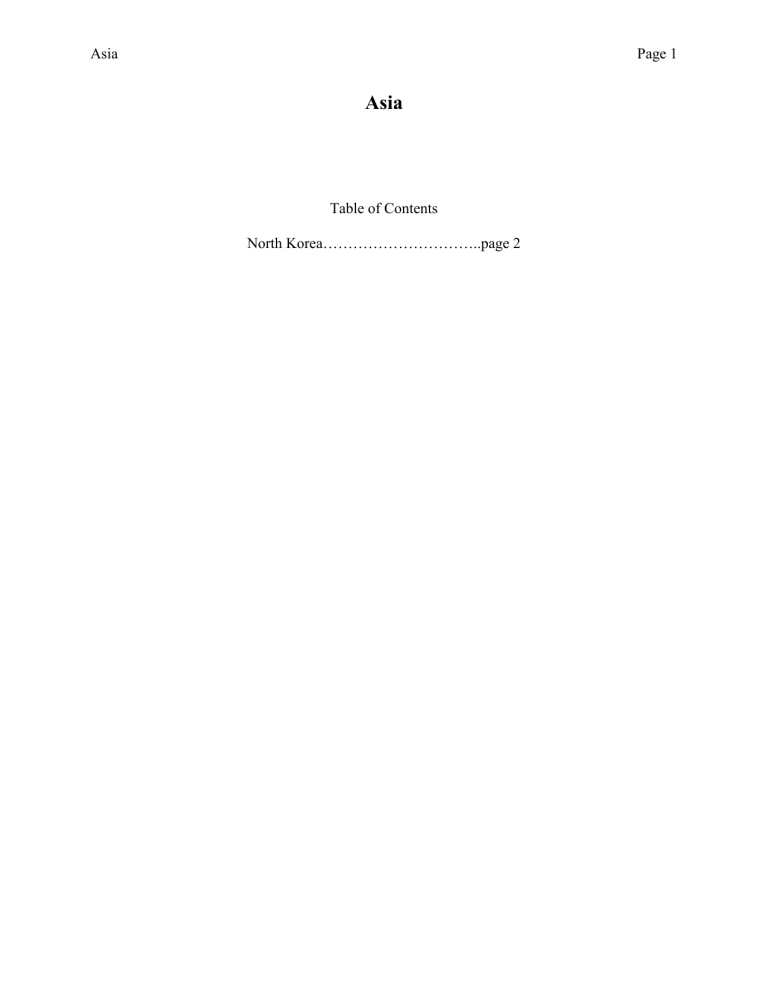
Asia Page 1 Asia Table of Contents North Korea…………………………..page 2 Asia Page 2 North Korea – Daniel Lemire (Last updated September 2014) Facts Officially known as the Democratic People’s Republic of Korea (DPRK) Population Occupied by Japan 1905-1945 Independence from Japan August 15, 1945 DPRK was officially founded September 9, 1948. Korean War (1950-53) was a failed invasion of the South Korea, Republic of Korea (ROK) The three leaders of North Korea have been: Kim Il Sung (1945-1994) Kim Jong Il (1994-2011) Kim Jong Un (2011-Present) DPRK borders China and Russia to the north and South Korea in the south Korean Workers Party (KWP) lead by Kim Jong Un controls the government and the other two political parties. No official Diplomatic ties to the U.S. GDP of $28 Billion est. 2009 GDP per capita, 2011 est. $1,800. This is the 198th in the world Imports China 73%, South Korea 19% 2012 est. Topics Nuclear Tests / Long Range Missiles North Korea has a successful nuclear program. The regime has tested nuclear weapons in 2006, 2009, and 2013. Despite the regime’s nuclear capabilities its long range missiles have been less successful. Firstly experts say they are still years from being able to deliver a nuclear warhead with these missiles. Out of the conventional missiles that North Korea has successfully tested, the Nodong has the greatest range (1000KM). This is far enough to reach China, South Korea, and the southern half of Japan. Economy Since 1990 North Korea’s economy has stagnated. There is very little economic activity inside North Korea. Most of the economic activity that does go on is either, government jobs, a limited service industry, or basic agriculture. The country’s GDP is 28 billion dollars, Vermont has a GDP of 25 billion but is twenty times less populous than North Korea. Another way of putting it is that North Korea has a population equal to that of Texas and a GDP equal to that of Vermont. The GDP per person is $1,800. Recently North Korea has attempted to prop up its economy by forming farmers markets where a limited amount of capitalism is allowed. Furthermore they have developed special economic zones in China where North Korean merchandise is bought and sold. Labor camps have been constructed where North Koreans are forced by the government to harvest raw materials for western companies. Furthermore Kaesong is a factory in North Korea which is run by South Korean managers. It is used to generate money for the North and is the only such example of interstate economic cooperation between the North and South(other than simple on sided aid). Asia Page 3 Famine North Korea has been threatened by famine since 1995. Frequent weather related food shortages have aggravated the systemic problems of, a lack of good farmland, ineffective collective farming practices, poor soil quality, lack of fertilization, and shortages in equipment. The current regime has been ineffective at alleviating any of these issues. North Korea relies heavily upon international food aid. 20% of children under five years old are underweight. The average North Korean is around 3 inches shorter than the average South Korean due to malnutrition during the first years of life. Weapons Proliferation North Korea has a history of selling weapons to the highest bidder. Assisting various regimes in the middle east and elsewhere while also helping terrorist groups and other nongovernments acquire weapons. Policy of Self Reliance After the Korean War, North Korea led by Kim Il Sung began a policy of self reliance, as a check against outside influence. This policy has continued throughout the DPRK’s recent history. This policy has left the country an international outsider with zero political allies, except for China which wants to avoid having a strong U.S. ally such as the R.O.K as a direct neighbor. Conflicts with South Korea (R.O.K) Outside of the tensions that exist at and along the DMZ North Korea and South Korea have butted heads over the years. In 2010 the Cheonan sunk in the yellow sea. An international investigation alleged that it was a North Korean torpedo that sunk the ship and its 104 crewmen. 46 South Korean seamen were killed. Also in 2010 North Korean artillery fired at Yeonpyeong island in the Yellow sea. Two South Korean marines and one civilian was killed. South Korea returned fire on a limited basis, North Korea alleged that the South had fired first. Death Camps It is all but confirmed that the DPRK has numerous labor camps in the country. Political dissidents and criminals are taken to these camps and forced to work in inhumane conditions. In these camps you work until you die, and many men women and children do die everyday. The guards control life and death and use their power to rape and abuse. It is estimated that thousands of North Koreans are kept in such camps.

